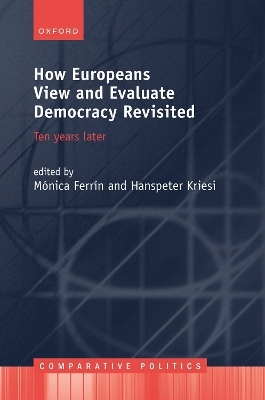
How Europeans View and Evaluate Democracy
Oxford University Press (Verlag)
978-0-19-888331-9 (ISBN)
- Noch nicht erschienen (ca. Februar 2025)
- Versandkostenfrei innerhalb Deutschlands
- Auch auf Rechnung
- Verfügbarkeit in der Filiale vor Ort prüfen
- Artikel merken
Ten years and several crises later, the authors reassess how Europeans view and evaluate democracy, and that many changes that have occurred in the meantime. This book, How Europeans View and Evaluate Democracy Revisited, compares how Europeans view and evaluate democracy in 2021-22 and in 2012 based on surveys in 24 European countries. It shows that Europeans continue to be attached to democratic ideals and that they continue to be rather dissatisfied with the way these ideals are implemented in their country. The liberal-democratic model continues to enjoy great support, just as it did a decade ago, and there is also support for additional models of democracy - for social, direct, and populist democracy. Surprisingly, the populist model turns out to be a complement rather than a substitute for the other models.
Comparative Politics is a series for researchers, teachers, and students of political science that deals with contemporary government and politics. Global in scope, books in the series are characterized by a stress on comparative analysis and strong methodological rigour. The series is published in association with the European Consortium for Political Research. For more information visit: www.ecprnet.eu.
The series is edited by Nicole Bolleyer, Chair of Comparative Political Science, Geschwister Scholl Institut, LMU Munich and Jonathan Slapin, Professor of Political Institutions and European Politics, Department of Political Science, University of Zurich.
Mónica Ferrín is an associate professor at University of A Coruña (Spain). She worked previously at Collegio Carlo Alberto in Turin and at the University of Zurich. Her main fields of research are public opinion, political participation and gender inequality in the public sphere. Hanspeter Kriesi is a part-time professor for Comparative Politics at the European University Institute in Florence. Previously, he held the Stein-Rokkan Chair at this university, as well as positions at the universities of Amsterdam, Geneva, and Zurich. 2017, he received the Mattei-Dogan Prize, and in 2022, honorary doctorates from the University of Lucerne and the Mid-Sweden University in Sundsvall. Together with colleagues from the LSE and the University of Milano he is currently working on an ERC Synergy project on the impact of the multiple crises on the resilience of the European Union.
1: Mónica Ferrín and Hanspeter Kriesi: Introduction
2: Ruxandra Comanaru and Rory Fitzgerald: The challenges of repeat measurement in times of the COVID-19 pandemic
Part I: Views of democracy
3: Enrique Hernández: Stability and change in Europeans' views of democracy
4: Mónica Ferrín and Levente Littvay: Populism as an alternative model of democracy: measuring and profiling the supporters of the populist model
5: Hanspeter Kriesi: Stability and change in the structure of Europeans' views of democracy
6: Besir Ceka and Pedro C. Magalhães: The correlates of European citizens' views of democracy
7: Claudia Landwehr and Armin Schäfer: Changes in Europeans' evaluations of democracy
Part II: evaluations of democracy
8: Mariano Torcal and Alexander H. Trechsel: The evaluation of democratic performance from a comparative longitudinal perspective
9: Irene Palacios: The relationship between views and evaluations of democracy
10: Bernhard Wessels: Stability and change - legitimacy and populism
Part III: Additional questions going beyond views and evaluations
11: Sergio Martini: Support for democracy and support for autocracy: two sides of the same coin?
12: Micha? Kotnarowski, Rados?aw Markowski: Political legitimacy and satisfaction with democracy in Europe
13: Mónica Ferrín, Enrique Hernández and Pedro Riera: Democratic views and voting behavior
14: Dietlind Stolle: Conclusion: For Europeans, democracy is alright
| Erscheint lt. Verlag | 13.2.2025 |
|---|---|
| Reihe/Serie | Comparative Politics |
| Verlagsort | Oxford |
| Sprache | englisch |
| Maße | 156 x 234 mm |
| Themenwelt | Sozialwissenschaften ► Politik / Verwaltung ► Politische Systeme |
| Sozialwissenschaften ► Politik / Verwaltung ► Staat / Verwaltung | |
| Sozialwissenschaften ► Politik / Verwaltung ► Vergleichende Politikwissenschaften | |
| ISBN-10 | 0-19-888331-5 / 0198883315 |
| ISBN-13 | 978-0-19-888331-9 / 9780198883319 |
| Zustand | Neuware |
| Haben Sie eine Frage zum Produkt? |
aus dem Bereich


